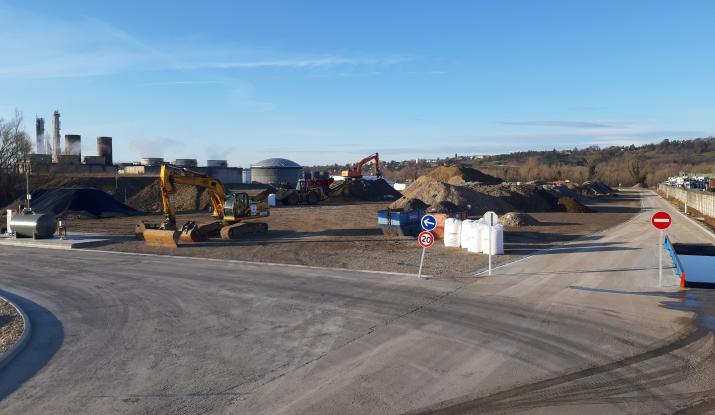From waste to product: Terenvie, cornerstone of circular cement in the community
Two years after the agreement to create it, the Terenvie platform, which has been operating since June 2019, is seeing business grow day by day.
What is Terenvie?
On Thursday, December 7, 2017, Didier Petetin, COO of the Vicat group, and Guy Mathiolon, chairman and CEO of the SERFIM group, announced that they had signed a joint-venture contract for the creation of Terenvie, a platform on a 3-hectare site in ‘Chemistry Valley’, just outside Lyons, for treating and upcycling non-inert soils. This initiative constitutes vigorous support of France’s law on energy transition for green growth and its target for 70% of waste from the construction and engineering sector to be recycled.
In response to the ‘Call of the 30’ made by the Greater Lyons Municipal Authority, it is intended to perpetuate Chemistry Valley as a hub of innovation, and Terenvie provides a solution for upcycling soil excavated in the course of construction projects in the region and making it part of a circular economy.
The platform therefore receives, sorts, and treats contaminated soil won from local earthmoving and excavation works.
Decontaminating up to 60,000 metric tons per year
Some non-inert soil is decontaminated at Terenvie site by means of a biological treatment known as phytoremediation, which uses micro-organisms and special plants (alfalfa in this case). Organic pollution is thus eliminated by the plants’ roots and associated bacteria.
Soil with a lower hydrocarbons content, but that is not inert nonetheless, is converted into cement by seizing the advantage of Vicat’s industrial process: not only is the cement kiln a fantastic resource for disposing of certain materials when industrial wastelands are won back, but in so doing it can reduce the consumption of natural raw materials we would otherwise have to extract from quarries.
As the materials fuse at kiln temperatures of 1,450°C, any residual pollution in the soil is totally eliminated. Cement produced in this manner thus embarks on life with a ‘circular’ component.
We naturally have no hesitation in seeing this ‘circularity’ taken one step further by using such cement to build facilities at the very places from which the non-inert soil was taken.
Any waste soil that is inert is used beneficially for restoration of Vicat aggregate quarries. In this case too, the materials are given a second life: as backfill, the soil enables disused quarry sites to be won back, including as productive farmland. One such former quarry site now produces malting barley from which beer is made.
Terenvie has total treatment capacity of 60,000 metric tons per year.
The waste soil ‘harvested’ at Terenvie is 100% recycled and thus helps drive circular economy at the community level.
Initiative meeting Group policy
The platform thus tackles the issues of soil decontamination in the region in light of urban densification and its need for redevelopment of industrial brownfield sites. This environmentally virtuous endeavor is conducted in conjunction with the concepts of CSR and sustainable social ecology to which the Vicat group has harnessed its ambitions.
What is our next objective? Setting up a showroom at Terenvie to display low-carbon products and materials manufactured by Vicat that incorporate recycled elements. It will demonstrate in real terms what our cement-manufacturing process can achieve with the soils dispatched to the site.




